These photos show how this "homesteading" family lives off their Texas land and preps for emergencies
Gabrielle Bienasz

Matt, Sydney, and their two kids.Courtesy company
- Homesteading and prepping can both help people prepare for disasters and become self-sufficient
- Homesteaders often grow food and raise animals, and preserve food, while preppers generally try to keep stocks of supplies (homegrown or not).
Homesteading is a lifestyle where you grow your own food, which often gains traction in difficult times, experts told Insider.
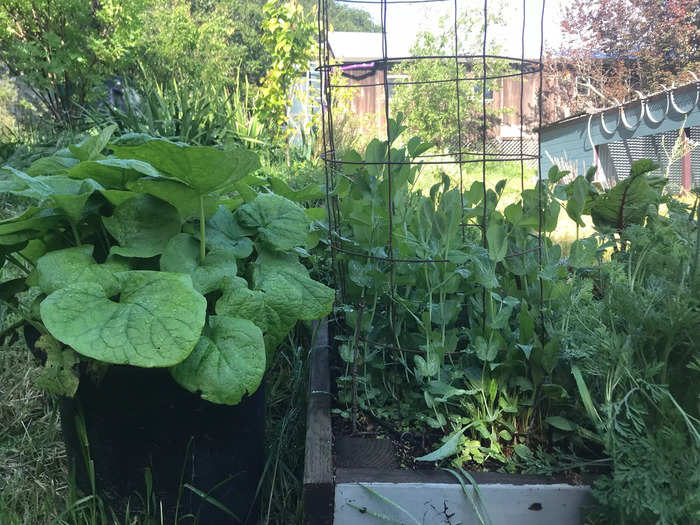
The garden of Rachel Kaplan, co-author of a book on urban homesteading. Rachel Kaplan
One of its early mentions was the 1862 Homesteading Act, where anyone who had not taken up arms against the government could claim land, which further displaced Native Americans.
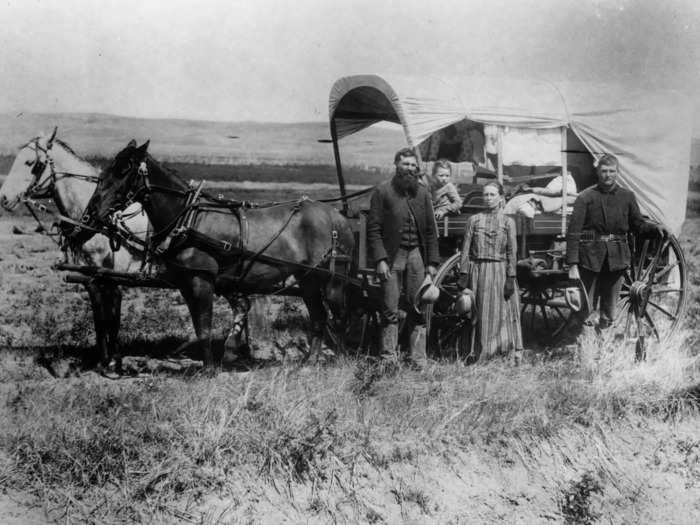
A family pose with their wagon in Loup Valley, Nebraska, on their way to their new homestead. (Homestead Meadows not pictured.) MPI/Getty Images
Homesteading is a bit like farming, but it has a specific connotations, especially in modern times.
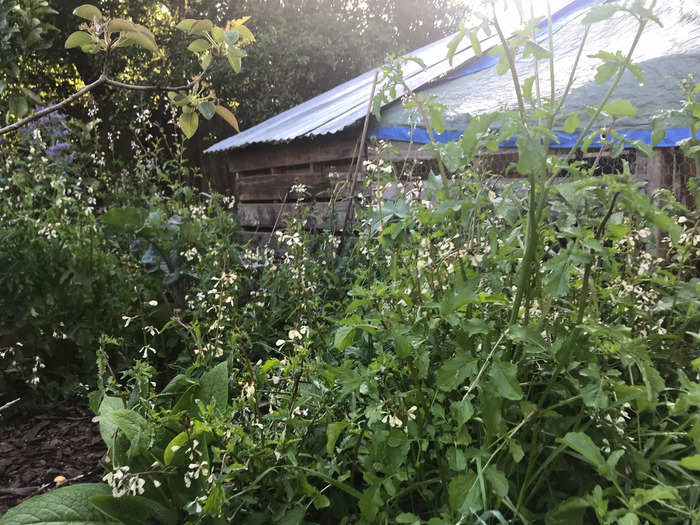
A shot from Kaplan's garden. Rachel Kaplan
Homesteaders, especially in the modern sense, tend to individually grow their own food or other products.
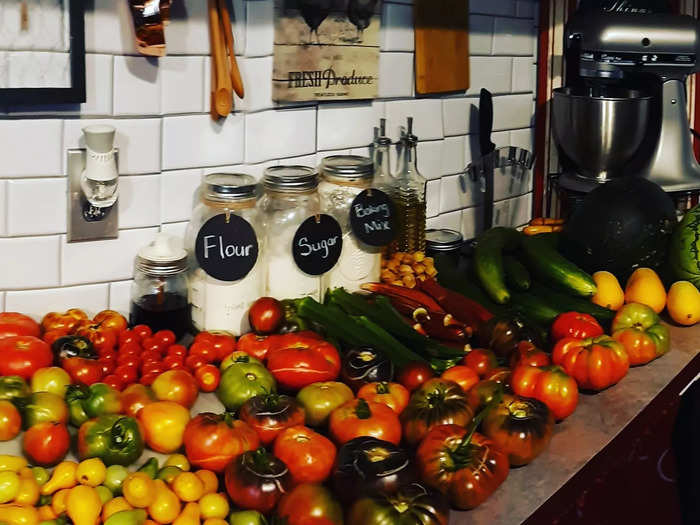
A yield from Nivek Anderson Brown of Leaf and Bean farm in Virginia. Nivek Anderson Brown
Most homesteaders have gardens of some kind.
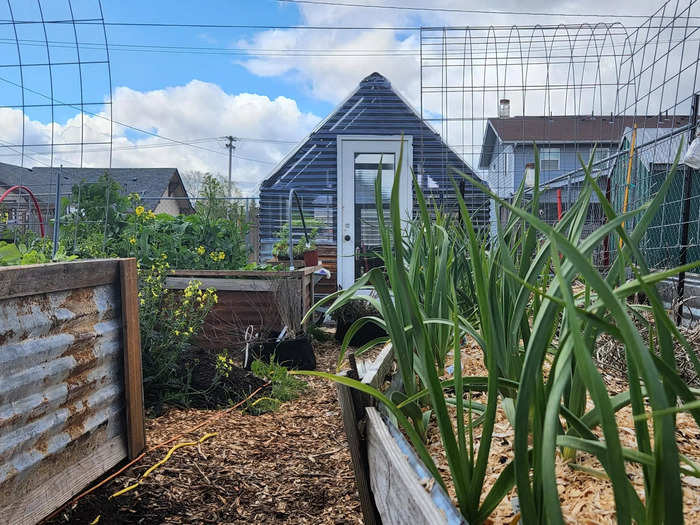
The Green Gardens homestead in Washington. Alliyah Perry
They often have land, but not always.
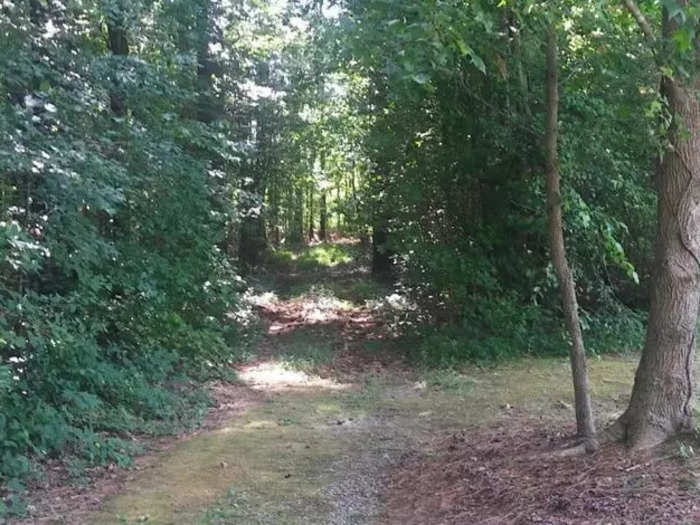
Land at the Leaf and Bean Farm homestead in Virginia. Nivek Anderson Brown
"It's about growing your food and living a bit more simply," said Alliyah Perry of Green Gardens Homestead in Washington.
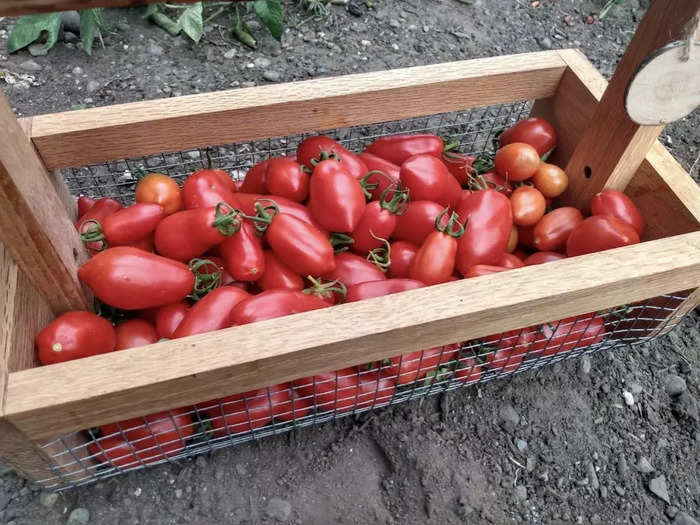
Yield from the Green Gardens homestead in Washington Alliyah Perry
Homesteaders will often forage or grow herbs, garden and raise crops, and take care of livestock.
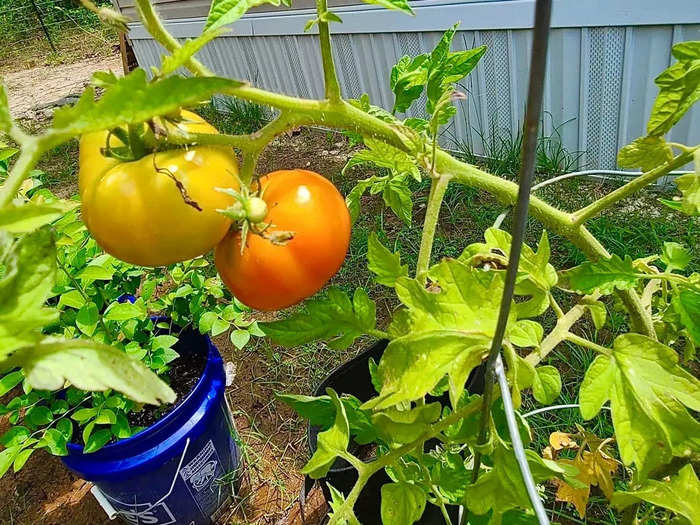
Some tomatoes from Standing Pine homestead in Texas. Courtesy company
"It's just a beautiful way to live," said Rachel Kaplan, who co-wrote a book on urban homesteading and began the practice after 9/11.
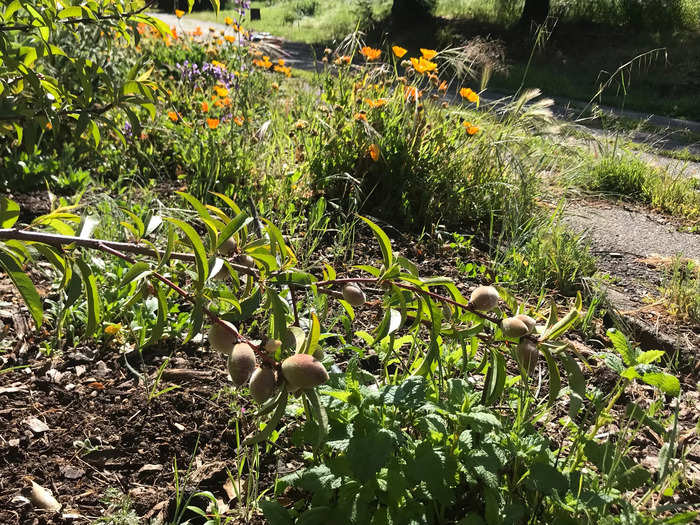
Peach, calendula, and sage by Rachel Kaplan Rachel Kaplan
With empty shelves and expensive food driven by inflation, pandemic, and war, the lifestyle has seen increased interest online, social media-homesteaders told Insider.
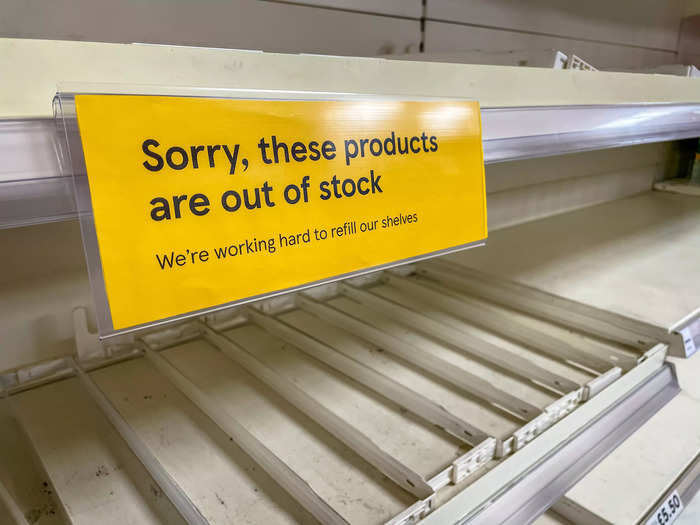
Craig Hastings/Getty Images
However, unlike for a lot of influencers, this often isn't a full-time source of income.
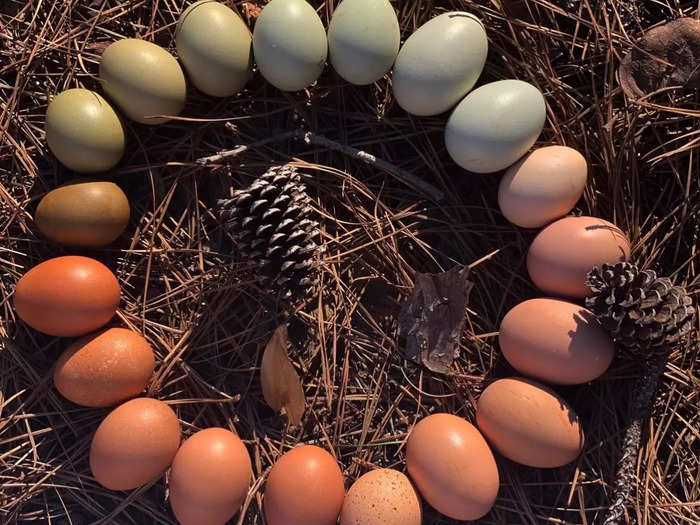
Standing Pine Homestead eggs Courtesy company
It's more of a way to feed your family and connect with the earth.
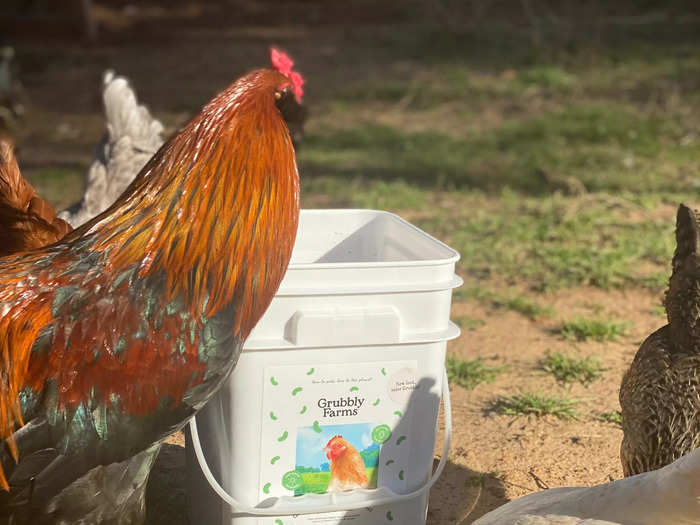
Chickens eating at Standing Pine. Courtesy company
That's at least the case for Cidni, a homesteader in East Texas.
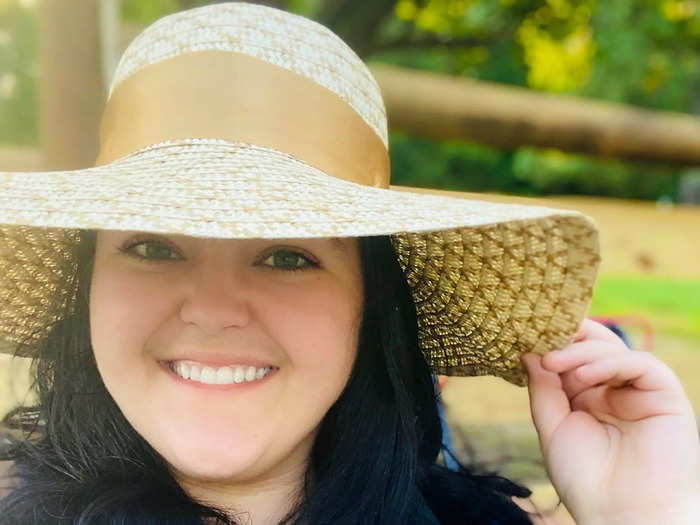
Cidni of Standing Pine. Courtesy company
(She doesn't use her last name online for privacy reasons.)
Cidni and her husband Matt moved to this half-acre "homestead" in East Texas in September 2020.
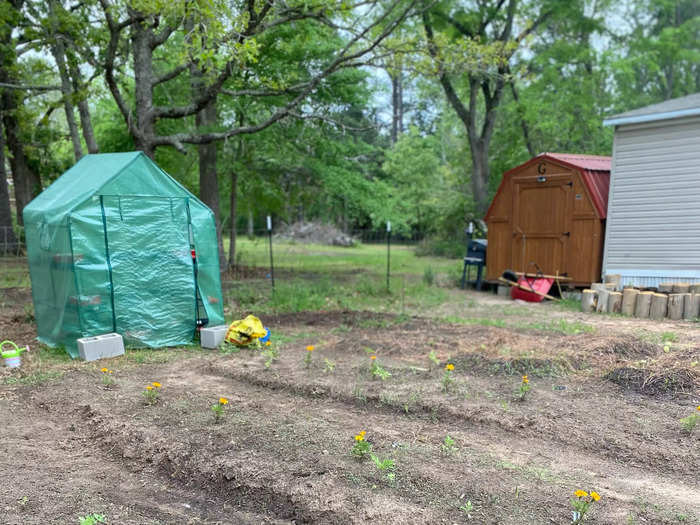
Standing Pine Homestead. Courtesy company
They call the place the "Standing Pine Farm" or homestead.
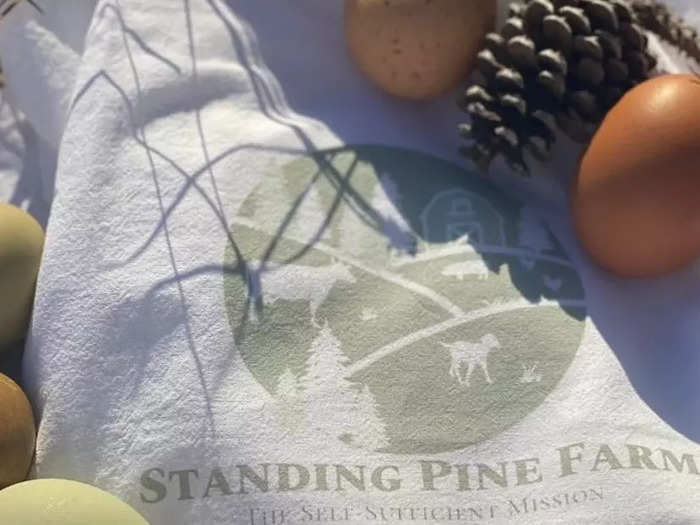
Standing Pine Homestead. Courtesy company
Here is Cidni, her husband Matt, and their two kids.
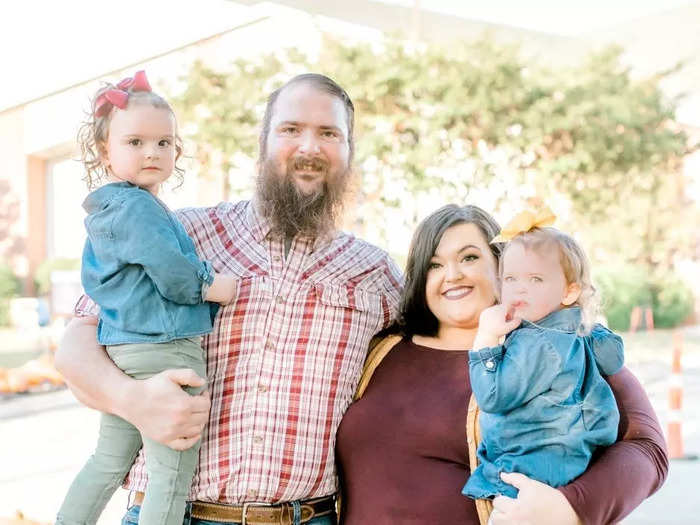
Matt, Cidni, and their two kids. Courtesy company
Cidni estimates they are about 30% self-sufficient on the homestead with a garden, livestock, and a backup heater and generator.
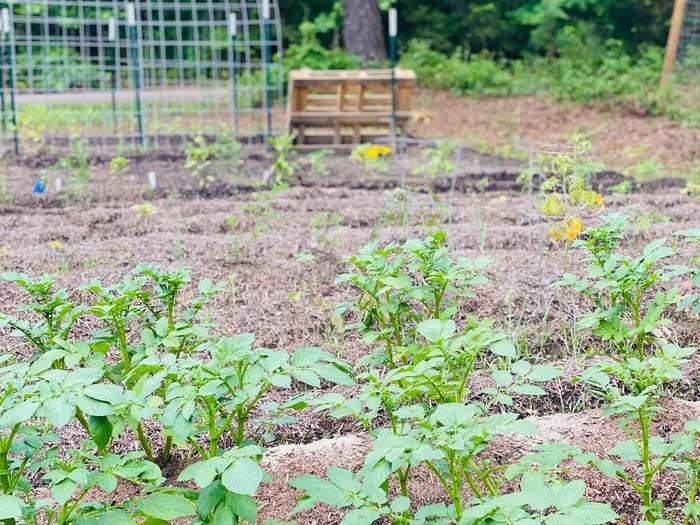
Standing Pines' garden. Courtesy company
That's because Cidni is also a "prepper," which sometimes brings to mind bunkers like this...
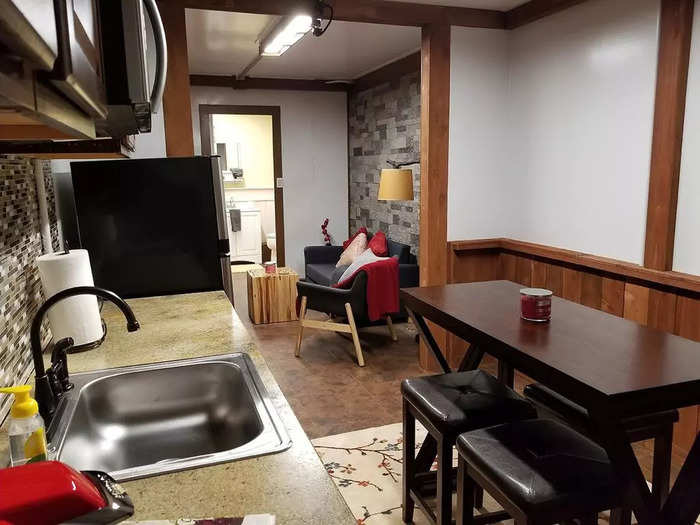
Inside a luxury survival bunker. Courtesy of Atlas Survival Shelters
...and this. Prepping and homesteading tend to see more interest when crises hit.
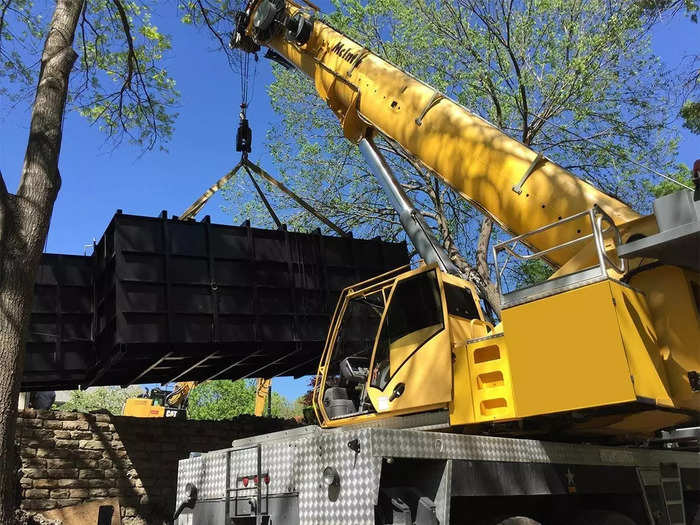
A bunker installation Courtesy of the Rising S Company
But for Cidni, "prepping" often involves preserving the food she and her family grow and buy.
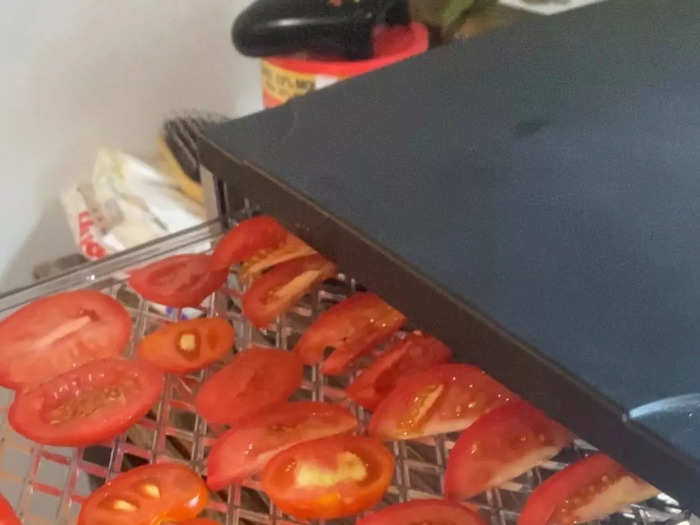
Tomatoes getting dehydrated for storage at Standing Pine Courtesy company
Sydney identifies as "prepsteader" -- a blend homesteader and prepper.
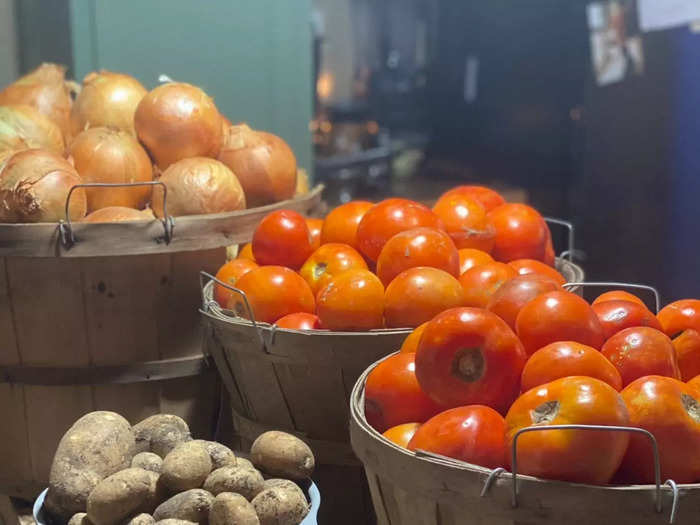
Standing Pine Farm goods plus some purchases. Courtesy company
Pure preppers tend to just store processed food, while most homesteaders end up preserving food in one way or another, Sydney said.
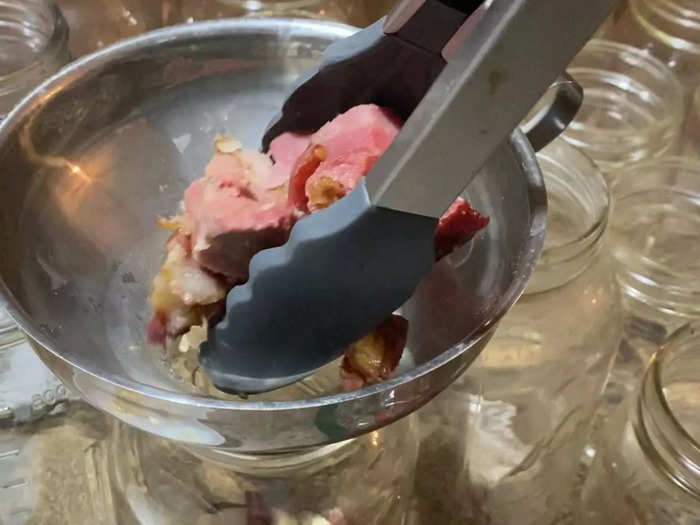
Preparing ham from a local pig and beans to store at Standing Pine. Courtesy company
For Cidni, she grows what they can, barters for some, and buys the rest en masse seasonally, storing it prepper-style.
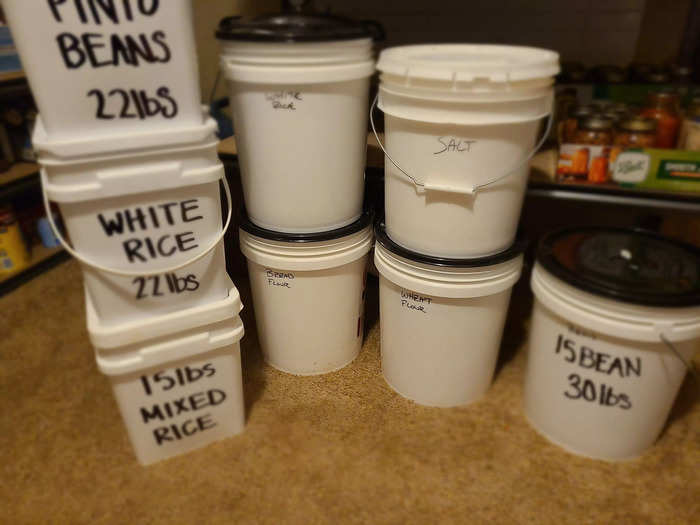
Prepped at Standing Pine. Courtesy company
Cidni spends a lot of time on weekends canning and preserving the food they grow.
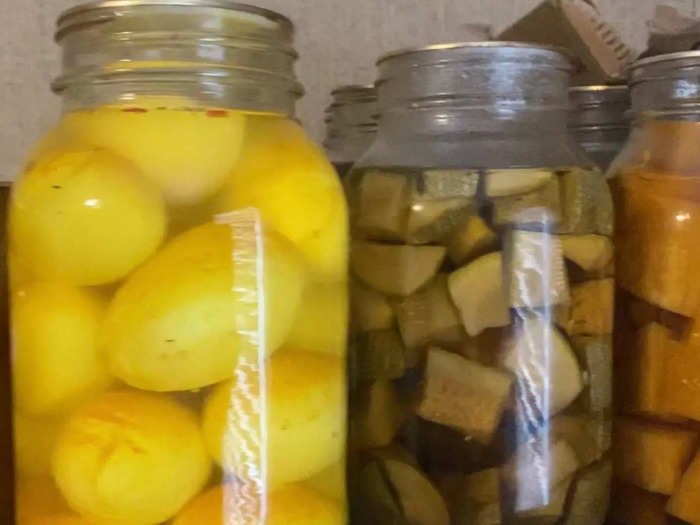
Canned at Standing Pine. Courtesy company
She uses two types of canners: a pressure canner...
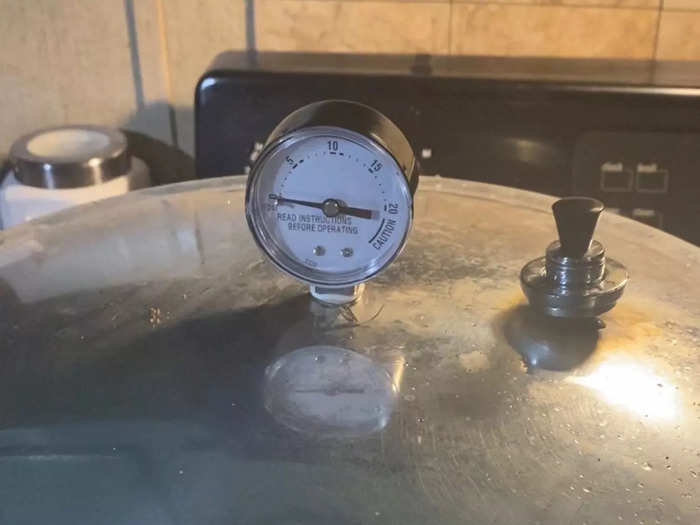
Pressure canning at standing pine. Courtesy company
... And a water bath canner
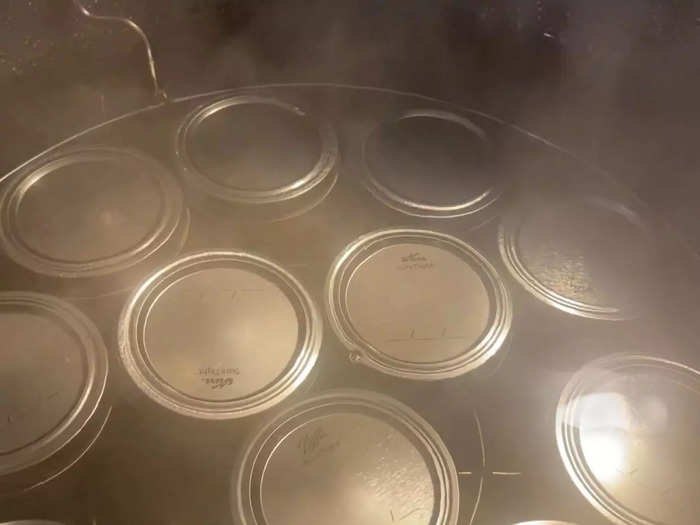
Water bath canning. Courtesy company.
Cidni said the water bath canner is really simple.

Water bath canning. Courtesy company
"You don't need any special canner for water bathing," she said. You just boil a jar or can underneath at least an inch of water for a certain period of time to create a vacuum seal, she added.
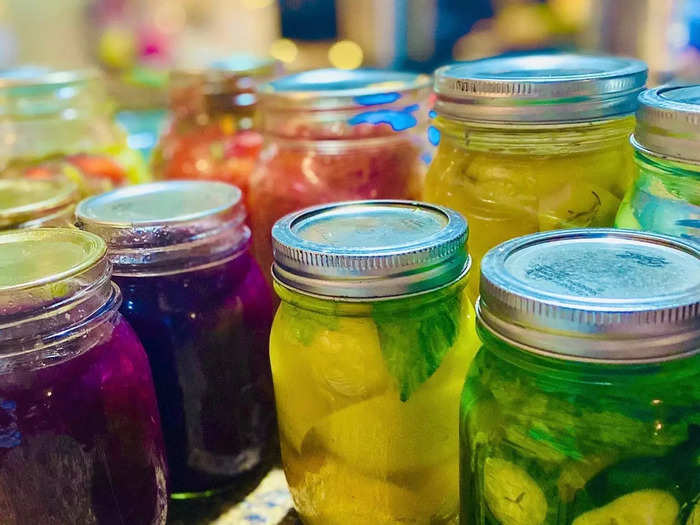
Canned goods from Standing Pine. Courtesy company
It has to be a high pH mixture or food to kill off bacteria and prevent them from growing for water bath canning. "That's what I usually process my pickles and things in," Cidni said.
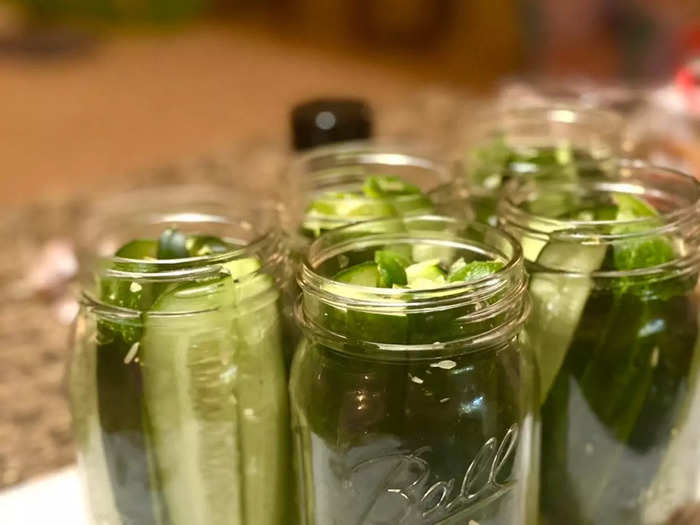
Cucumbers in a mason jar. Courtesy company
"And then my pressure canner is right here," Sydney said. "I cried when my husband bought me that. I was so excited."
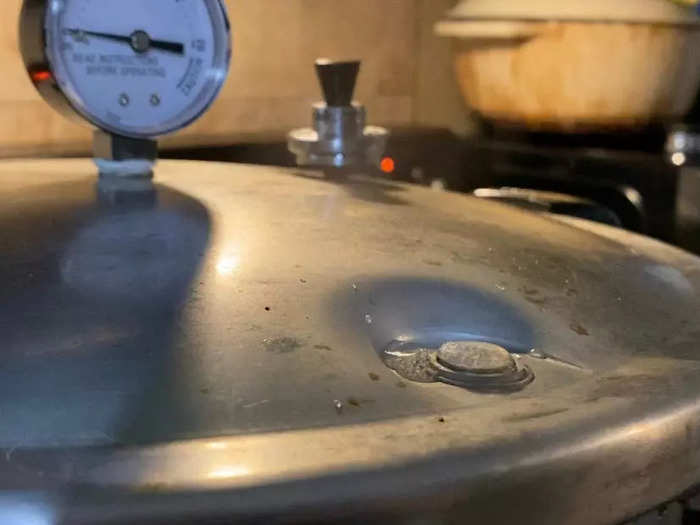
The top of a pressure canner. Courtesy company
It uses pressure to create a vacuum seal.
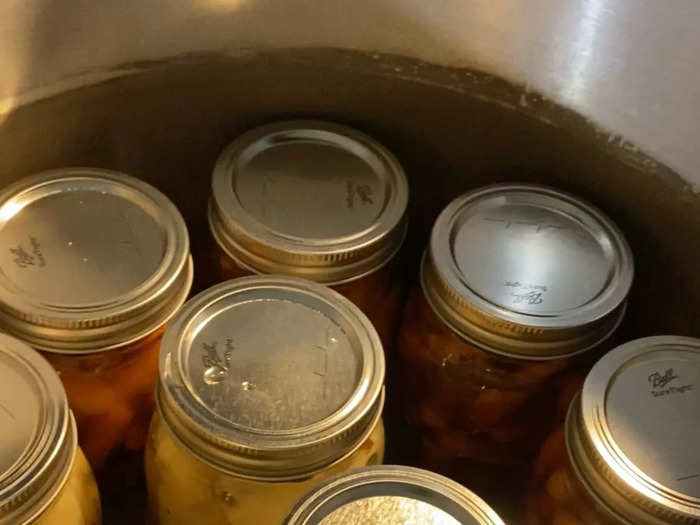
Inside the pressure canner. Courtesy company
"If I over-pressurize, it will pop and let steam out so the canners no longer blow up like our Grandma's did," Sydney said.
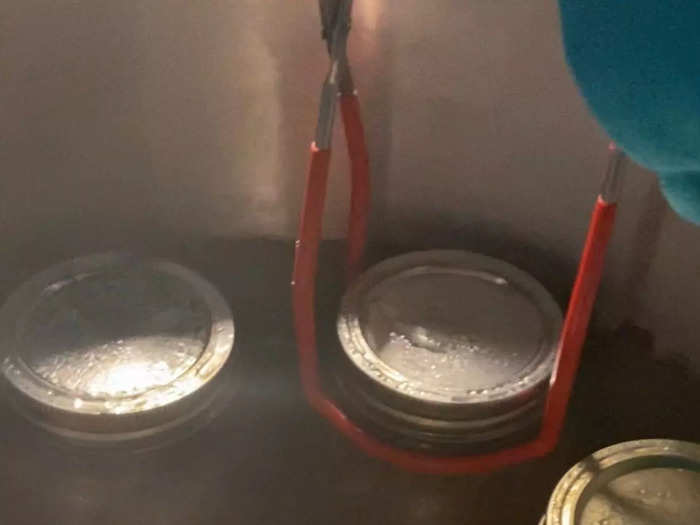
Another look inside the pressure canner. Courtesy company
Sydney uses "rebel canning" recipes, which means they are not precisely USDA-approved but she researches them herself, she said.
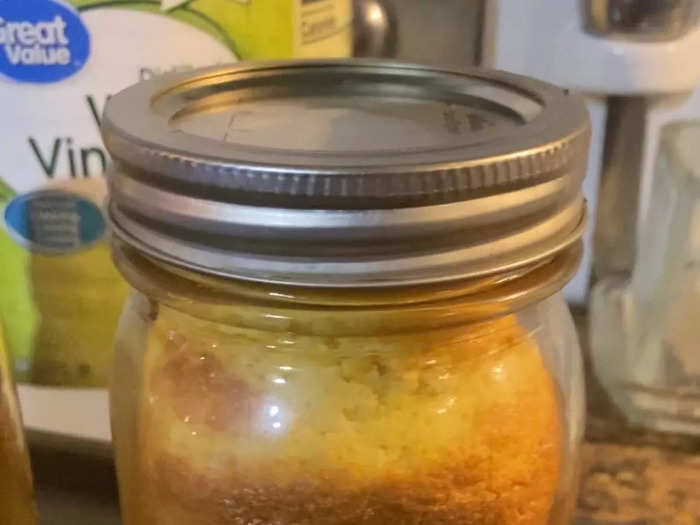
Canned cornbread at Standing Pine. Courtesy company
Cidni's prepper pantry. She grew and preserved the most of the food.
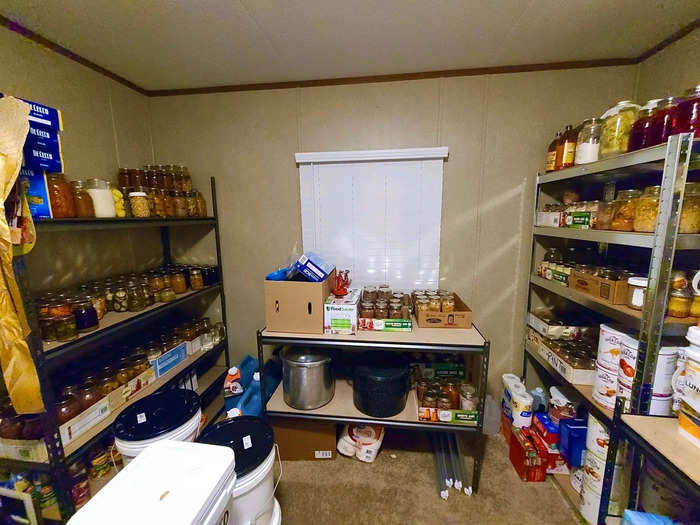
A prepper pantry. Courtesy company
"If I lost my job tomorrow, we would absolutely be able to feed our family without having to go to the grocery store for several months," Cidni said.
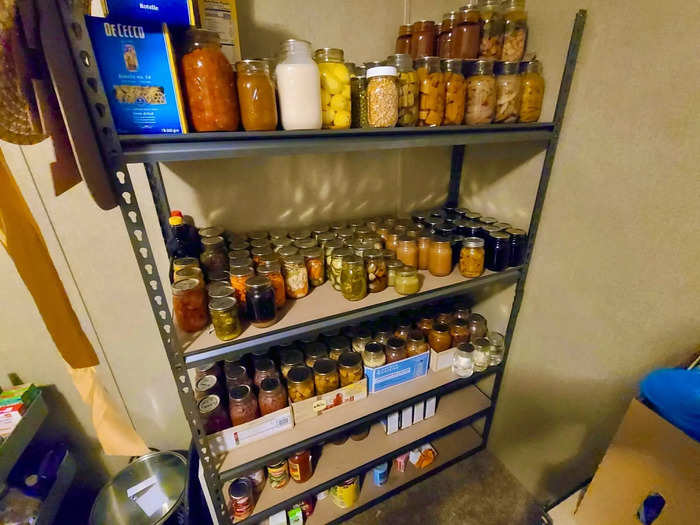
Prepper pantry with cans and jars. Courtesy company
Cidni got into prepping because of the pandemic, when she ran out of formula for her baby, Emma, now two and a half (left).
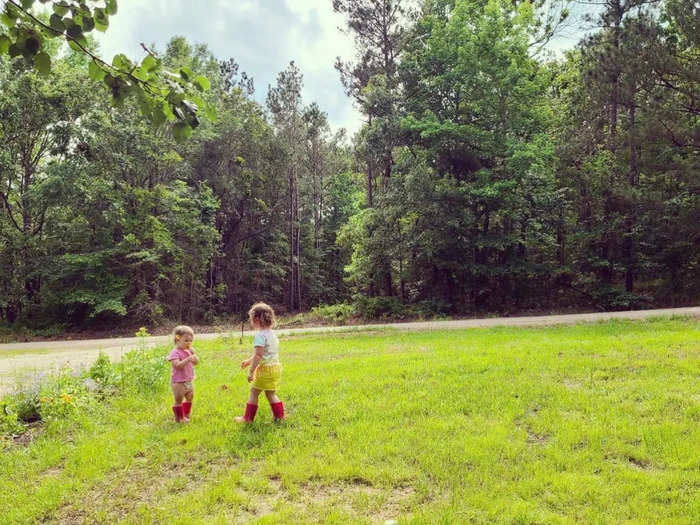
Emma and Lori playing at Standing Pine. Courtesy company
“My milk was not coming in, no matter what I did,” she said.
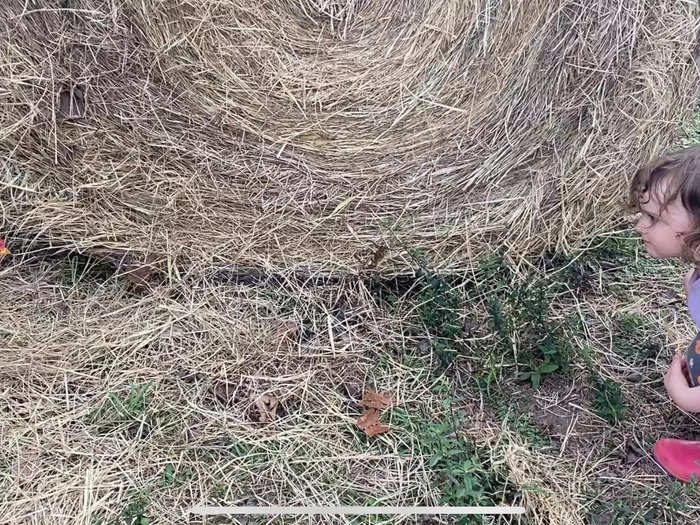
Staring down a chicken at Standing Pine. Courtesy company
Her daughter seemed to dislike milk-based formula, so she put her on goat's milk formula from Europe, which then got caught up in shipping delays.
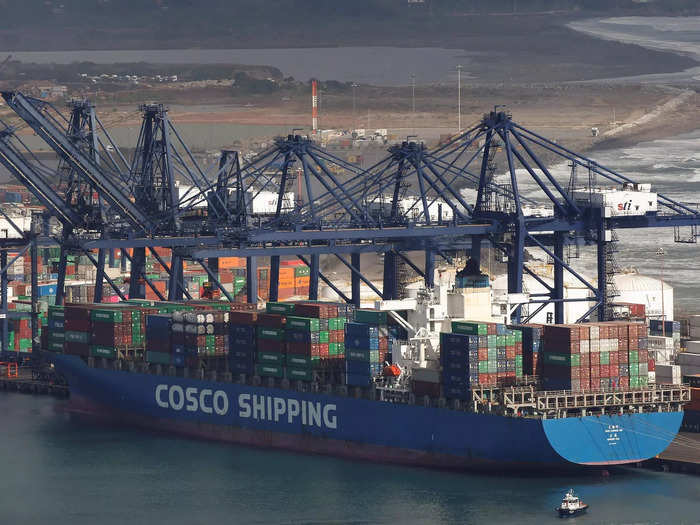
Reuters
The stores were also empty of regular formula, she said.
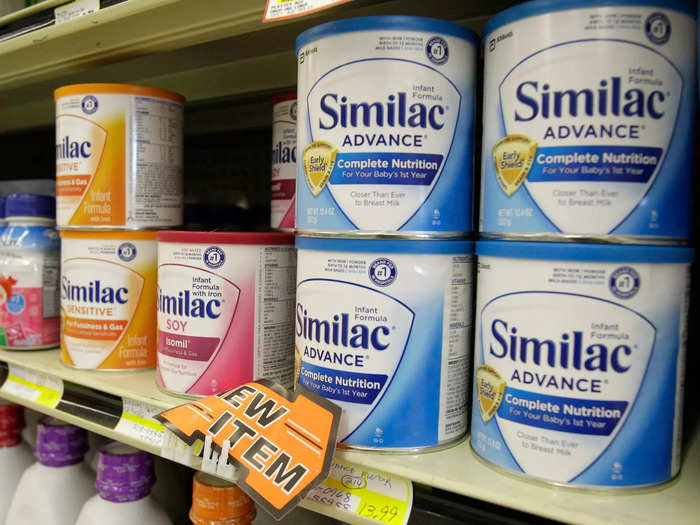
Similac baby formula is displayed on the shelves at Shaker's IGA in Olmsted Falls, Ohio. Mark Duncan/AP Photo
Sydney said she then posted in a local mom's group, and a dairy-free mom donated a month's supply. "All I remember was that her name was Heather and she was such a beautiful person," Cidni said.
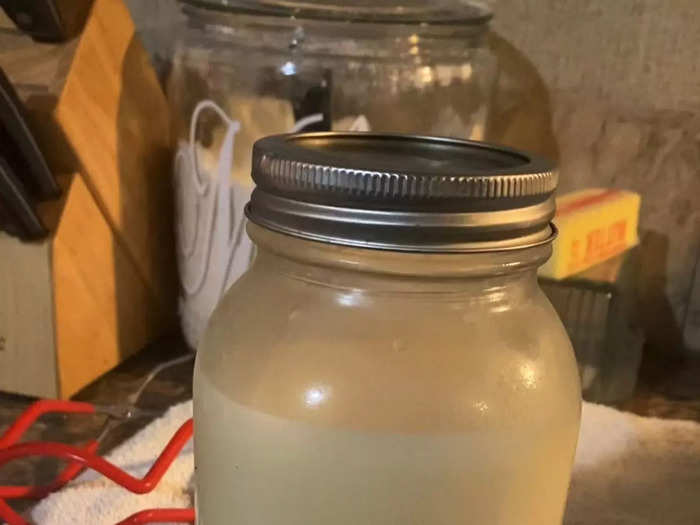
Canned milk. Courtesy company
The goat's milk eventually came in within that month.
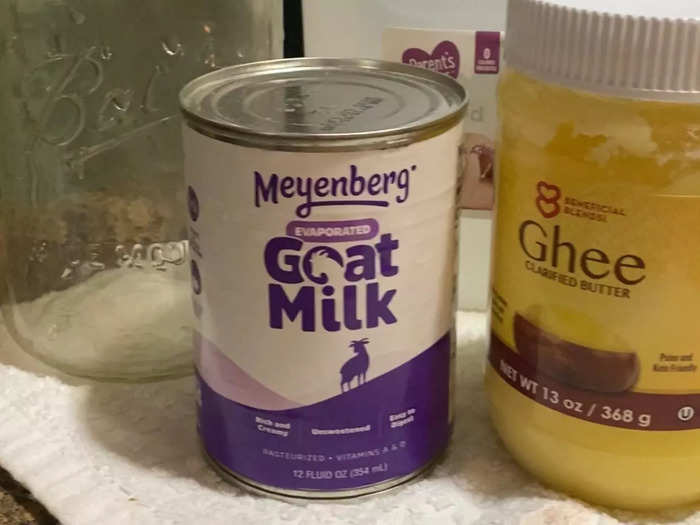
Milks at Standing Pine. Courtesy company
Matt and Cidni started prepping in 2016 but, were living in Lubbock, Texas when the pandemic it. The milk shortage accelerated their plans to homestead.

Jared Jurkowski's Airbnb in Galveston, Texas Jared Jurkowski
"We decided we had enough of living in the city and we needed to learn additional skills on how to feed our daughters, aside from just having extra food in the pantry," Cidni said.
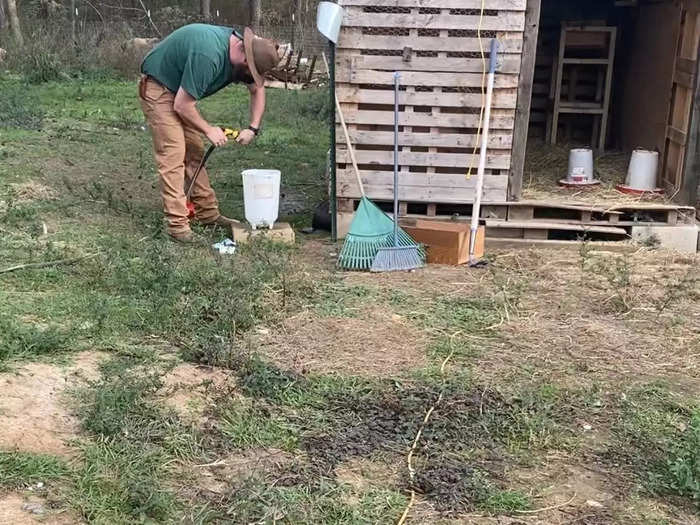
Life on the homestead. Courtesy company
She now makes TikTok videos on how to prep for infant formula shortages, Cidni said.

Instant milk. Courtesy subject.
But the general prepping topics have proved popular on TikTok. "I started posting more about canning, food preservation and prepping your pantry for inflation and the views shot up," she said.
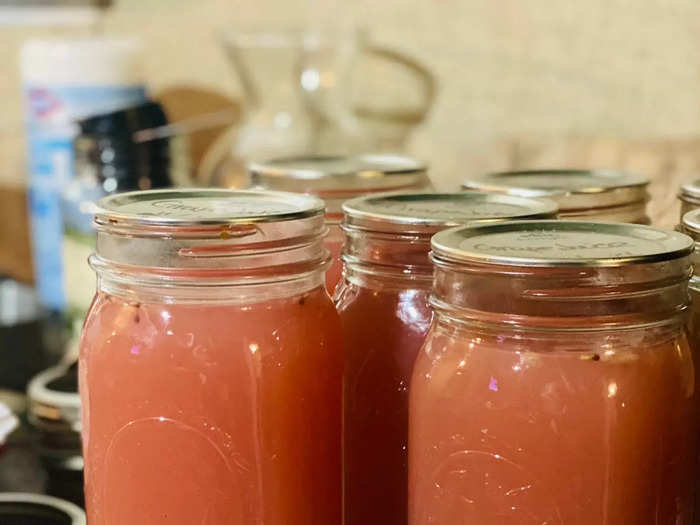
Canned grape juice. Courtesy company
Cidni juggles canning and TikTok-ing with working remotely as a systems trainer. Matt homesteads and gardens full-time.
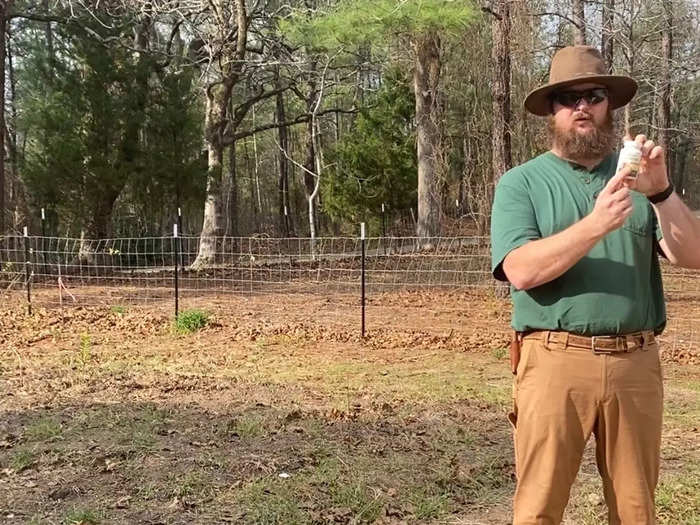
Matt taking care of the garden. Courtesy company
"My husband is wonderful and will distract the kids," Cidni said.
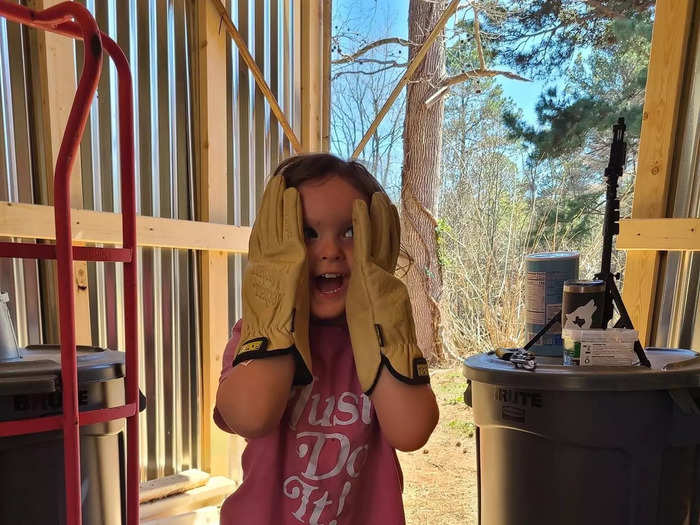
Lori, soaking up the homesteading vibes. Courtesy company
Matt works in the garden about two to four hours per day, depending on the season.
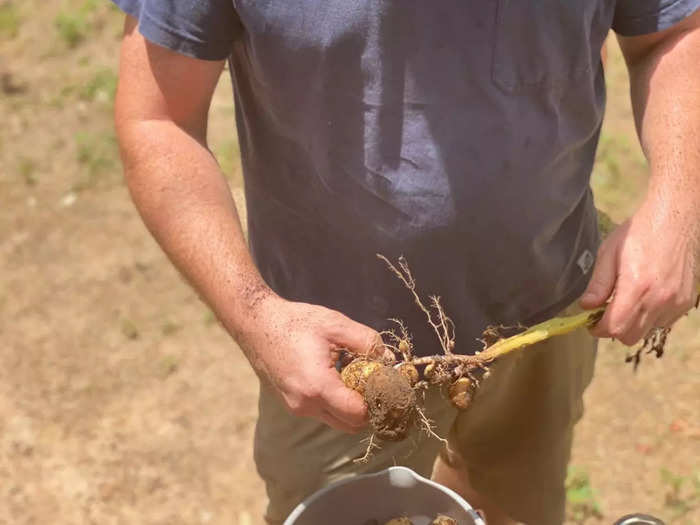
Matt gardening. Courtesy company
Matt got into prepping and homesteading through his rural childhood and family, plus an appreciation for apocalypse fiction and westerns (But he said he would not identify as a doomsday prepper.)
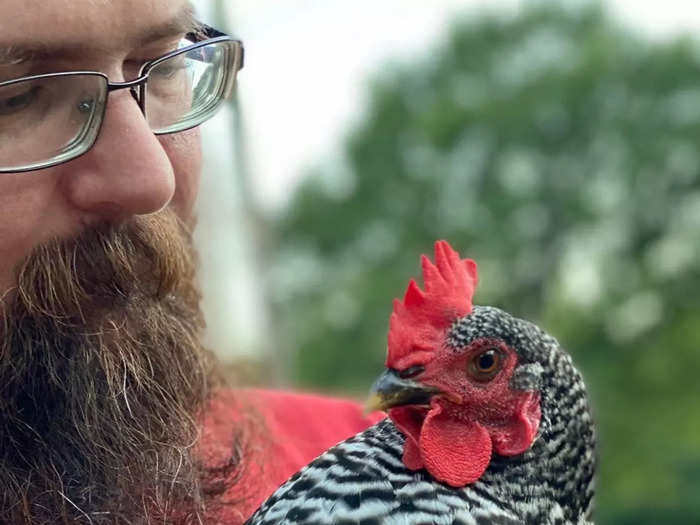
Matt with a chicken. Courtesy company
This year, he built raised beds for the garden.
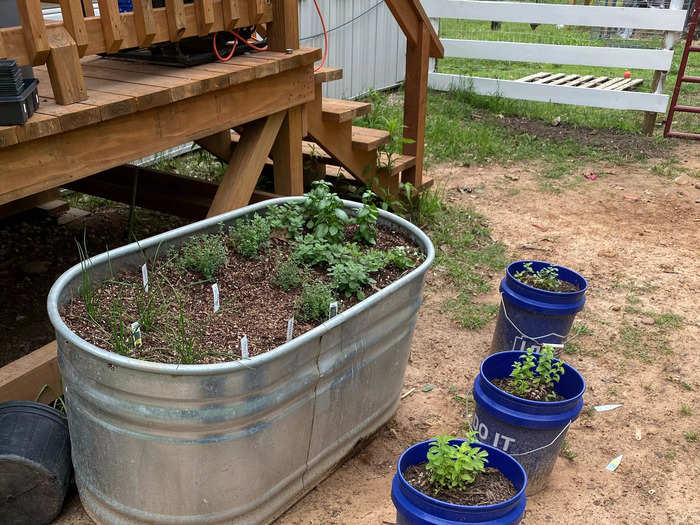
Matt's raised garden beds. Courtesy company
This year, they'll get about 200 pounds of vegetables from their garden, Matt added.
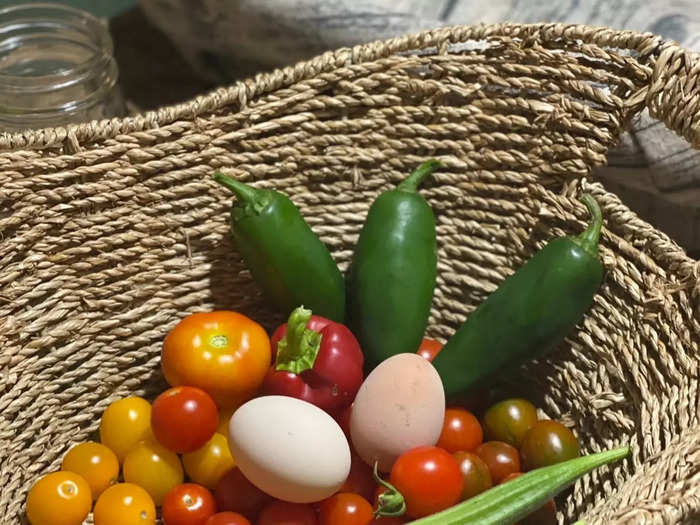
Standing Pine yield. Courtesy company.
“The labor of it is therapeutic. Sometimes, in the garden, I'll just kind of take off my shoes and just kind of let it all sink in,” Matt said.
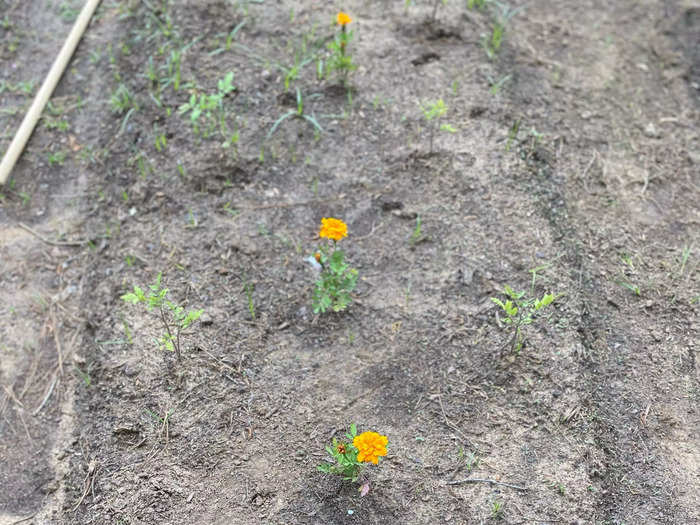
Gardening. Courtesy company
Outside, they also have a pasture and barn for their goats and chickens.
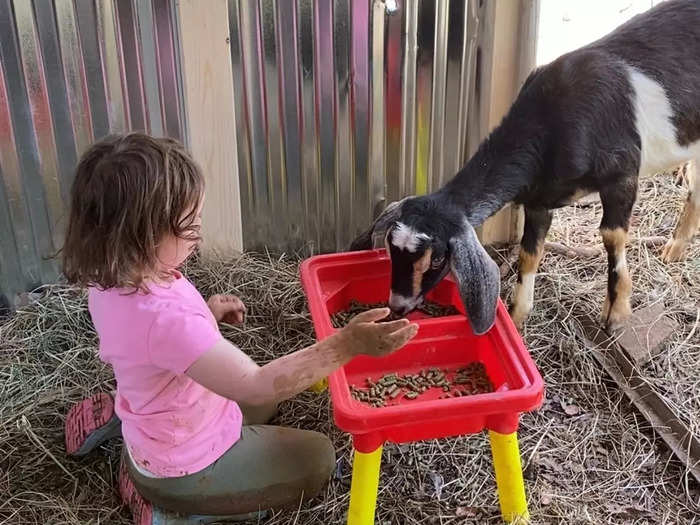
Lori feeding the goats. Courtesy company
"There is a huge sense of accomplishment when you are able to raise a baby chick from an egg," Cidni said.
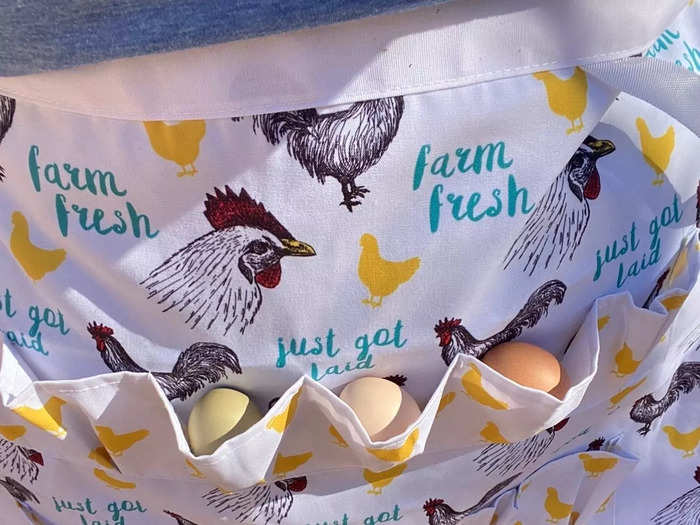
An apron full of eggs. Courtesy company
One homesteading endeavor that didn't work out so well for Cidni was cows.
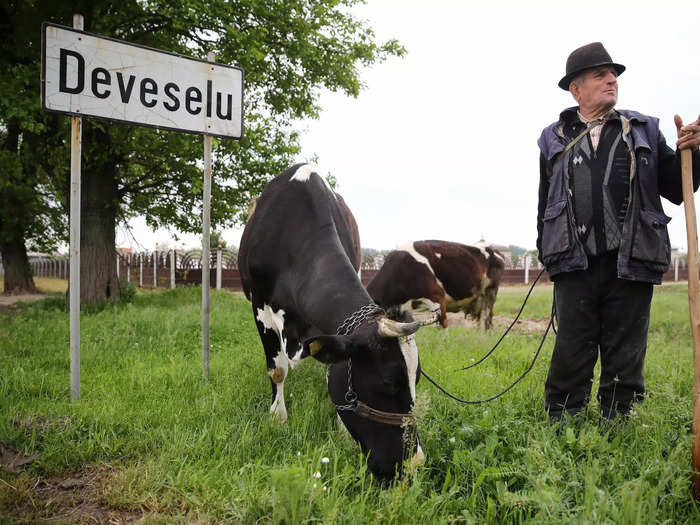
A cattle farmer and his cows next to the city sign of Deveselu, Romania, May 12, 2016. Kay Nietfeld/picture alliance via Getty Images
They had named the cows Patsy Cline and Dolly Parton -- a Standing Pine tradition of naming animals after famous people.
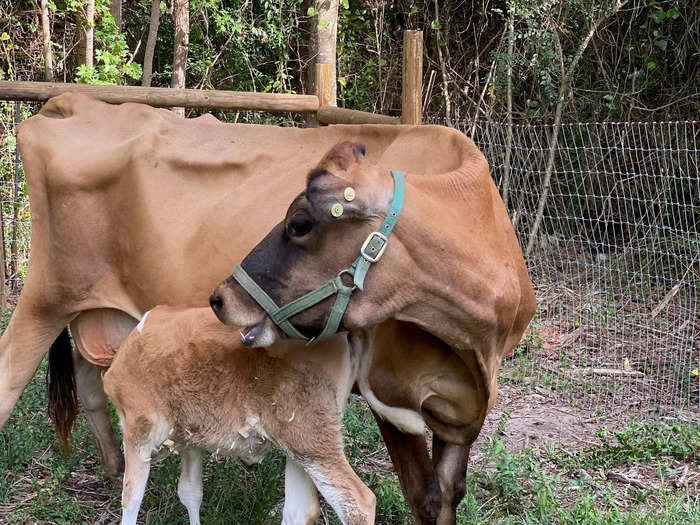
The former Standing Pine cows. Courtesy company
But, "once she started getting milked, she would kick," Cidni said.
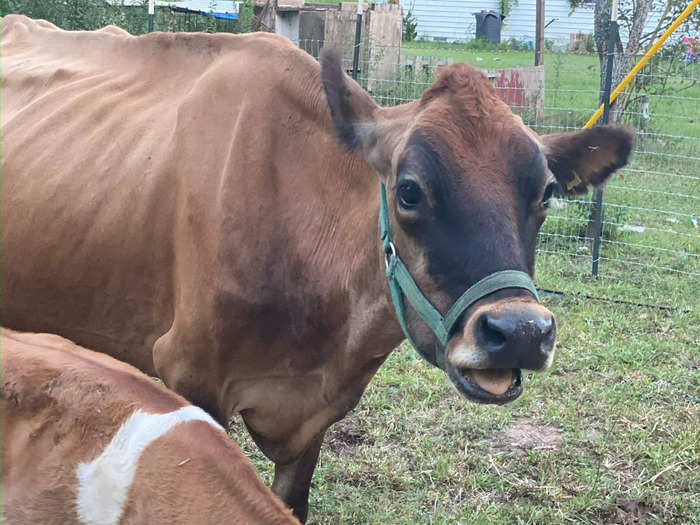
Pasty the calf and Dolly the momma. Courtesy company
Cows eat about 25 pounds of hay a day, so it's hard to keep one if they're not contributing, she added.
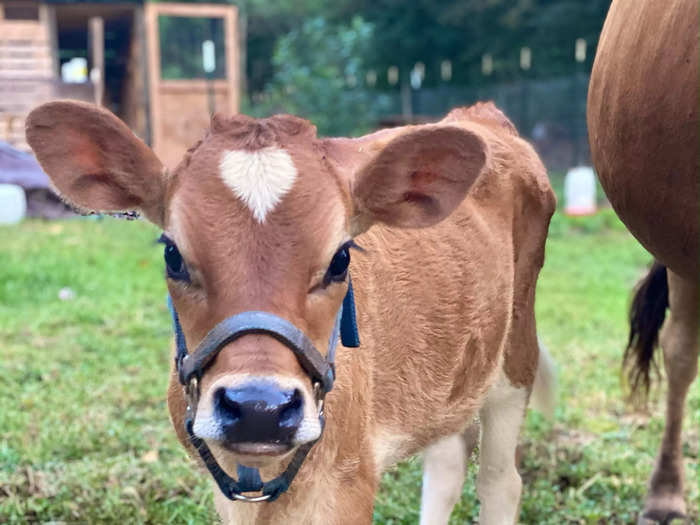
It's hard to keep a cow that doesn't contribute, she said. (Even if they're really cute) Courtesy company
So, they gave the cows to a nearby farm.
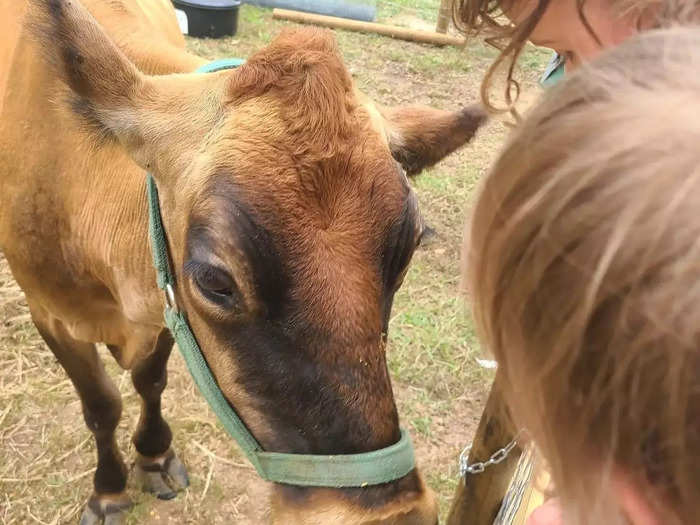
Cows and kids. Courtesy company
Community is part of Cidni and Matt's approach to homesteading, such as bartering for elderberry syrup and raw milk with their extra eggs at nearby farms.
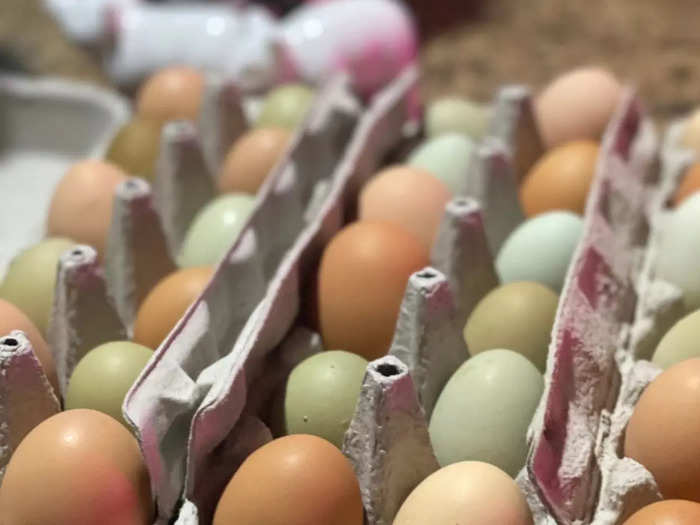
Standing Pine eggs Courtesy company
Overall, they say their lifestyle is rewarding.
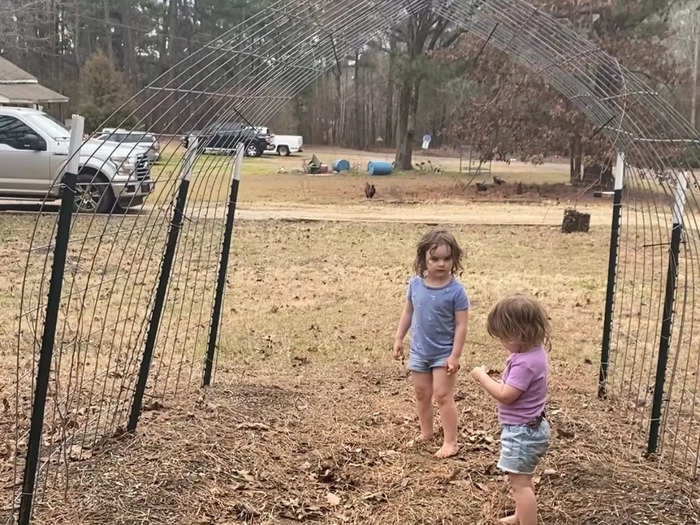
Lori (left) and Emma (right). Courtesy company.
“There is a peace and a connection to nature with this lifestyle, and it taps into the part of our souls that we always knew was there,” she said.
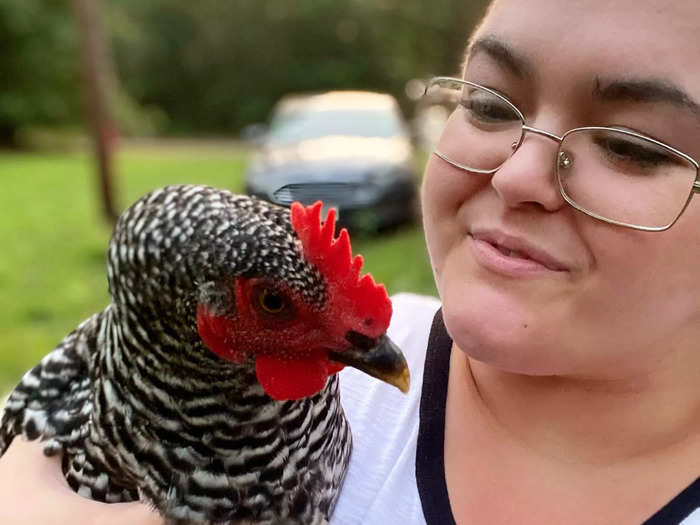
Sydney with a chicken. Courtesy company
It’s also cheaper.
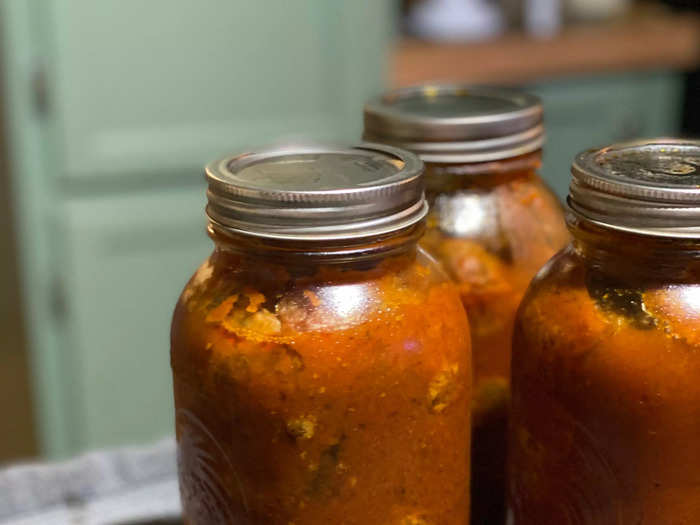
Canned goods. Courtesy company
Cidni estimated that they spent $100-$150 a week on food and now try to spend just $150-$200 a month at the grocery store.
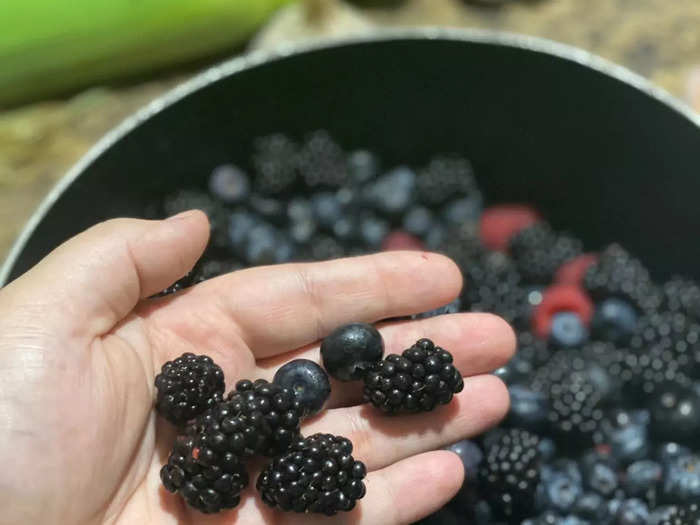
Berries, some of which they grew. Courtesy company
They mostly shop for things they can't make, like flour and rice, or the occasional treat, like doughnuts or tortilla chips and try to buy from other farmers whenever possible. You just can't grow all your own food on half an acre, Cidni said.
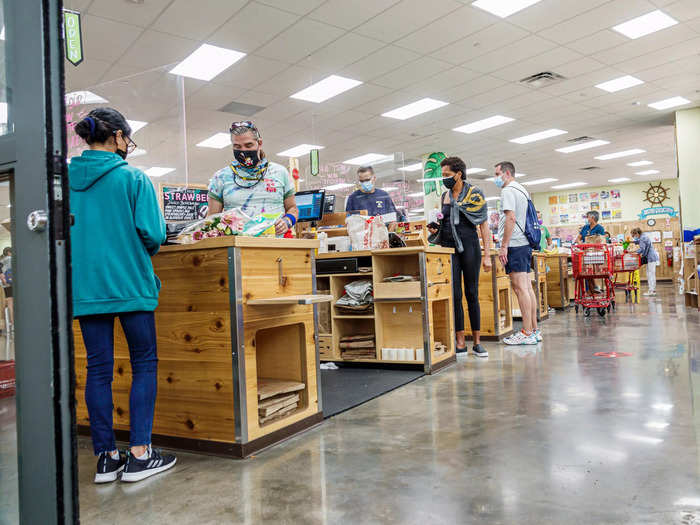
People wear masks at a supermarket in Miami Beach, Florida, on April 19, 2021. Jeff Greenberg/Universal Images Group/Getty Images
She noted they have only made about so far $800 from Facebook promotion and Amazon affiliate links -- but do have 96,000 TikTok followers.

Mateusz Slodkowski/SOPA Images/LightRocket via Getty Images
"We learned so much from so many creators, mostly on Youtube, and when we made the decision to homestead on a half-acre, we wanted to share our journey with others," Cidni said.
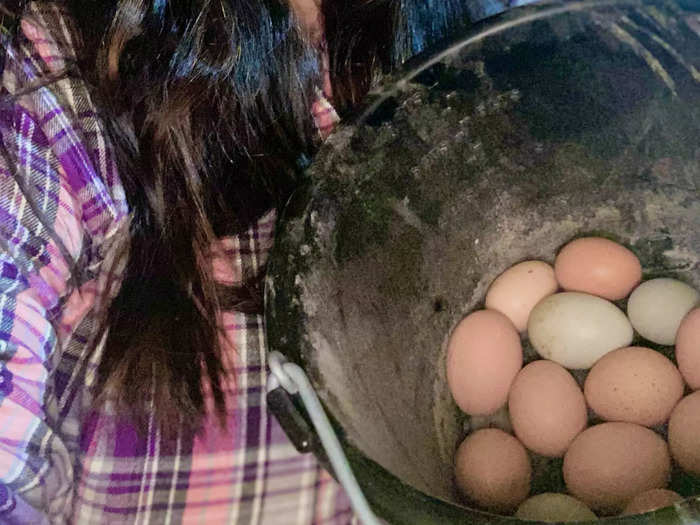
Sydney of Standing Pines. Courtesy company
“I think people have a general interest in preserving food and having things on-hand for emergencies. And that's how I approach it, so I think that they respond to my non-panic, fear-inducing [method],” she said.
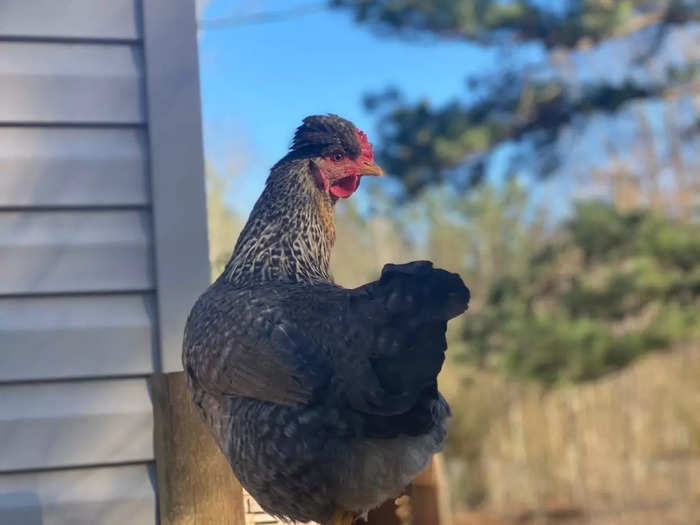
A chicken looking back. Courtesy company.
READ MORE ARTICLES ON
Popular Right Now
Popular Keywords
Advertisement